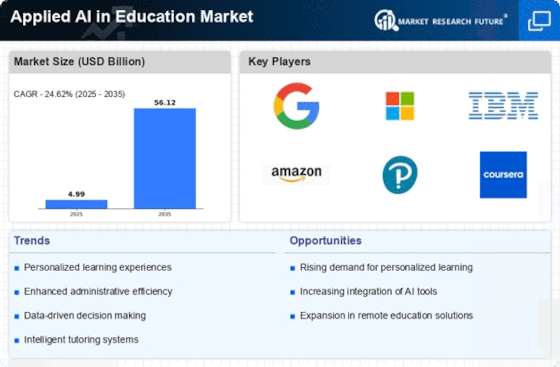Market Share
Applied AI in Education Market Share Analysis
The market for Applied AI in Education has been transformed, in which the landscape of learning and teaching has been reshaped through integrating Artificial Intelligence into educational processes. One more recent trend in this market is that of personalized AI-driven learning platforms. By analyzing individual student performance data, learning styles, and preferences, these platforms can customize educational content accordingly and adapt to each student’s speed and capacity for understanding it better. This trend aligns with the education sector's commitment to providing tailored and effective learning experiences, enhancing student engagement, and addressing diverse learning needs.
In addition, there has been a growing emphasis on intelligent tutoring systems within the Applied AI in Education market. Adaptive algorithms guide AI-based tutoring systems that provide real-time feedback support to students leading to a more interactive approach towards learners’ needs. In this way individualization makes instruction more effective as it enables learners to master necessary concepts at their own pace actually reinforcing comprehension abilities in school subjects among others.
Another major trend worth noting is the utilization of AI for automation of administrative assignments as well as streamlining educational workflows. For instance, AI-driven systems have found their way into education where grading and scheduling are done by machines instead of humans. Therefore, this trend ensures that tutors avoid unnecessary workload on administrative issues thereby giving them more time to attend to their primary responsibility of teaching, mentoring and supporting learners.
Additionally, there has been a rise in applied AI in education such as AI-powered assessment tools. These tools leverage student performance data to identify areas for improvement, gaps and strengths in performance. This trend helps to promote data-driven decision-making in education so that educators can provide personalized instruction, spot vulnerable students at risk including targeted interventions for individual learning journeys.
The market has also witnessed the use of artificial intelligence enhanced virtual classrooms and e-learning platforms due to increased remote and online learning services demand. Personalization of e-learning experience through the use of Artificial Intelligence algorithms fosters interaction among trainees leading to real-time feedbacks from instructors operating from virtual environments. It thus takes into account how education delivery changes with time towards ensuring online learning remains engaging, effective and responsive to the needs of an individual learner.


















Leave a Comment